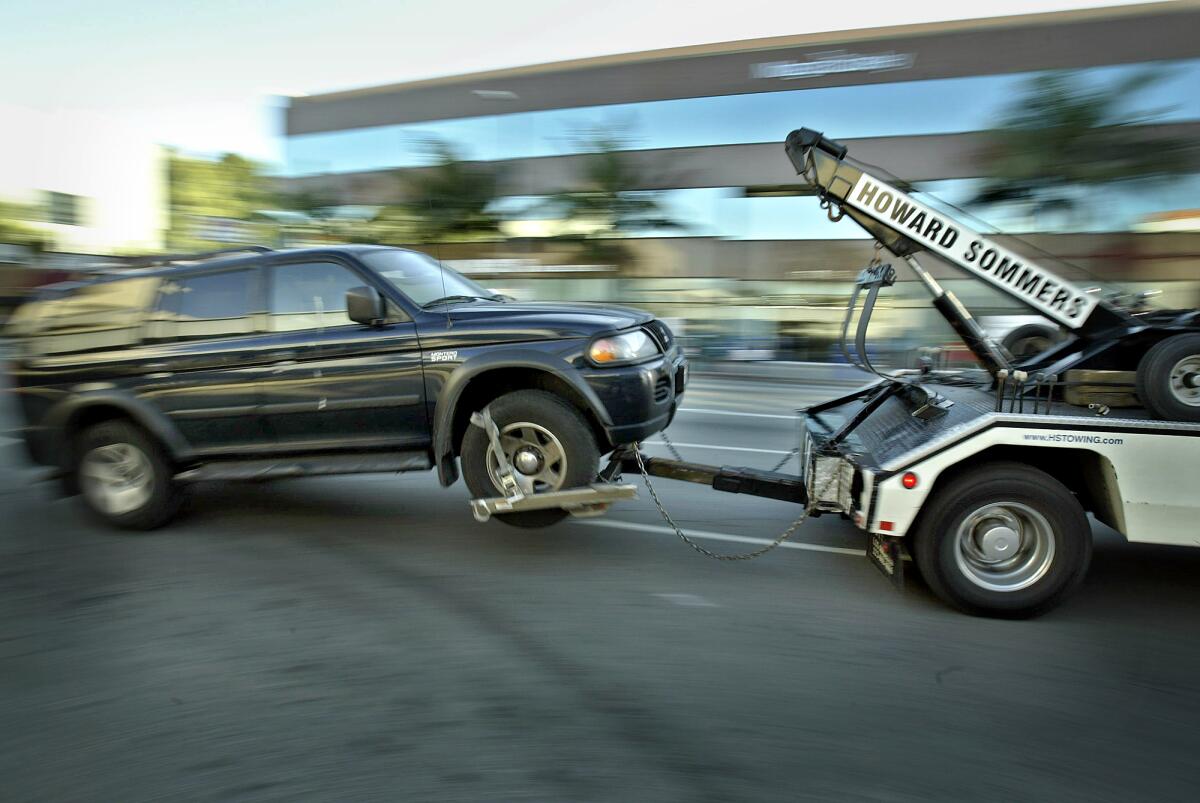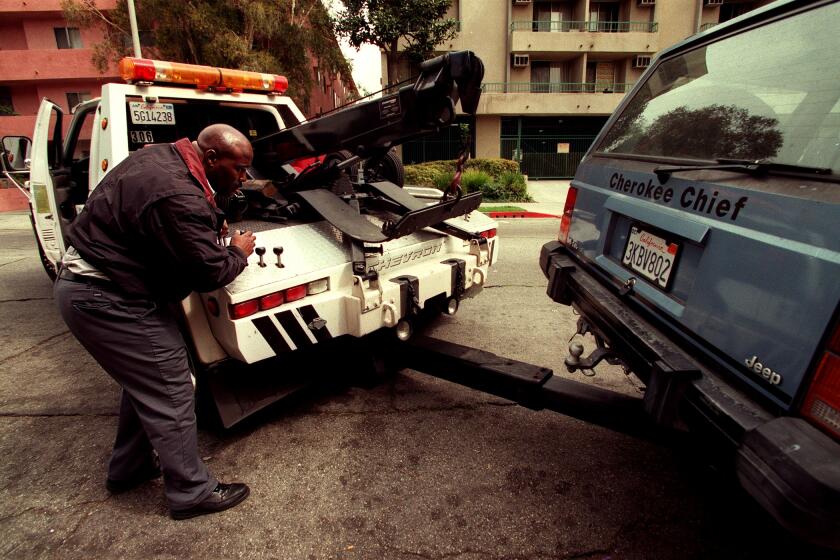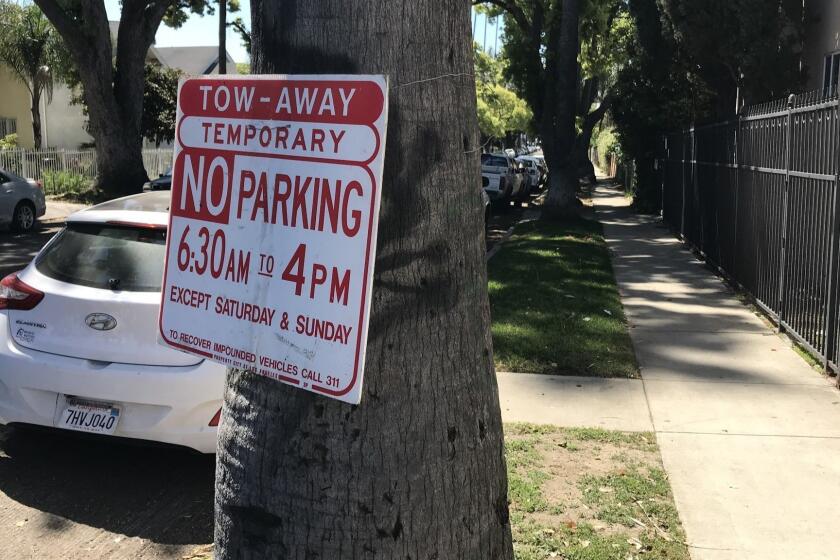Opinion: I canât afford to pay parking tickets, so my car got towed. It upended my life

As a widow and single mother in L.A. County who depends on survivor benefits, I knew I was just one disaster away from poverty. That disaster came in June this year when my car was towed for an insurmountable debt of unpaid parking tickets.
Usually Iâm good at moving my car before 10 a.m. on street cleaning day, but on this particular morning, I received a call from my daughterâs summer camp alerting me that she was complaining of dizziness. Her pediatrician suggested on a telehealth call that she be taken to the hospital for tests. I hurriedly ran out to my car and then realized...
It wasnât there.
Your vehicle has been towed â now what? Follow these steps to recover your vehicle and maybe even some of your money.
I knew exactly what had happened. My well-used Jeep Cherokee, covered with bird droppings and fallen leaves from the elm trees above, hadnât been stolen â it had been towed for all the parking tickets I couldnât afford to pay.
A quick call to the police departmentâs traffic division confirmed this, along with my debt totaling $3,088. With registration, city administrative, towing and daily impound storage fees, that debt has since nearly doubled.
Two years ago I moved into my apartment. Since it didnât come with a parking space, I received multiple citations our first week there. The âno parkingâ limits from 2:30 to 5 a.m.: $63. No stopping: $95. Expired meter: $58. My limited income was stretched so thin, I simply couldnât afford to pay them.
Then I received another ticket⌠and another. The late fees kept adding up, and my registration renewal was held for the nonpayment of just one ticket. Notices stamped âDELINQUENT PARKING VIOLATIONâ in bright red letters littered my desk. I felt completely overwhelmed. It got to the point where every time I saw a white piece of paper secured under my weathered windshield wiper, my heart would race and my chest tighten, knowing I would face yet another ticket I couldnât afford.
Under current law, California cities can authorize a vehicle to be towed or immobilized if it has five or more unpaid parking tickets. In order to get my car released from the impound, Iâm required to pay all fines to the DMV in full, as well as the fees accrued by the towing company. People call this a system of âpoverty tows,â which disproportionately affects low-income individuals who simply donât have the money for their parking tickets.
Over the last several years, California lawmakers have come to grips with how the increasingly pricey fines and penalties theyâve imposed for minor traffic and parking offenses can lead to financial ruin for low-income drivers.
âWhat happens if I canât afford to pay?â I asked the company who towed my car. âWeâll eventually auction it,â they told me, âbut youâll still be responsible for any fees not covered from the sale.â
Desperate to find a solution, I Googled âwhen your car is towed for unpaid parking ticketsâ and discovered a bill in the California legislature, AB 1082, that would eliminate poverty towing (with limited exceptions, according to the latest bill text). The Senate Appropriations Committee will decide on Friday what happens next to the bill.
Critics suggest this change would somehow reward and encourage more illegal parking. That misconception shows how out of touch opponents are with those who struggle living paycheck to paycheck and finding a place for their car. If someone canât afford to pay their tickets, how are they going to afford all the added towing and impound fees on top of that to pay off their debt? The tow yards get paid no matter what, and they earn more if you donât get your car back, from lien sales and accrued storage fees.
As a freelance video producer, I depend on my car not only to travel to different shooting locations but also as a DoorDash delivery driver between jobs. It wasnât much, but DoorDash gave me the extra income I needed so I could eventually save enough to pay off my parking debt. I felt like âThe Little Engine That Could.â Yes, there were challenges, money was extremely tight, but I had a plan to get out from under all this debt⌠I could do it!
Now that my car has been towed, I feel more like Sisyphus, punished for eternity never to get that boulder over the hill.
The toll on my mental health has hit me hard. From Day 1, I couldnât be there for my daughter when she was in the hospital. Iâm unable to make the income I need to support my family. Now I face losing my car and am buried in even greater debt.
The silver lining in all this is knowing I can play a small part to prevent this injustice from happening to others. It starts with sharing my story â and sharing why itâs so important to end poverty tows. Unaffordable parking debt should not block people from keeping their cars and livelihoods, establishing a reasonable plan to manage their debt, supporting their families or safeguarding their mental health.
Lesley Turner is a producer and founder of Call to Action Stories, a women-led video production team focused on driving positive social change.
More to Read
A cure for the common opinion
Get thought-provoking perspectives with our weekly newsletter.
You may occasionally receive promotional content from the Los Angeles Times.












